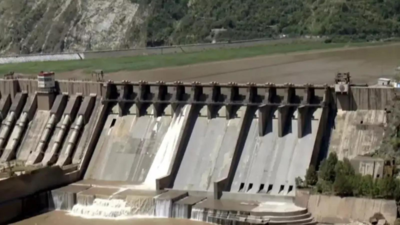ARTICLE AD BOX

NEW DELHI: Pakistan violated the Indus Waters Treaty (IWT) through "unrelenting cross-border terrorism", India said at an international forum in Tajikistan and justified its action of putting the 1960 treaty in abeyance following the Pahalgam terrorist attack.
The remarks, articulated by junior environment and external affairs minister Kirti Vardhan Singh at the Glaciers' Preservation conference in Dushanbe, came on Friday after Pakistan PM Shehbaz Sharif, at the UN-led global forum, accused India of weaponising water.Strongly condemning Pakistan's attempt to misuse the forum by raising IWT issues, Singh said the treaty's preamble stated that it was concluded in the spirit of goodwill and friendship, and that honouring the treaty in good faith was essential, but the cross-border terrorism from Pakistan interfered with its implementation."We are appalled at the attempt by Pakistan to misuse the forum and to bring in unwarranted references to issues which do not fall within the purview of the forum. We strongly condemned such an attempt," said Singh, addressing the plenary session of the conference.The minister said it was an undeniable fact that there had been fundamental changes in circumstances - technological advancements, demographic changes, climate change and the ongoing threat of cross-border terrorism - since the treaty was signed, which now required a reassessment of its obligations.
His remark is in sync with a clear understanding within government quarters about the need to revise the terms of the treaty, which has long been considered loaded against the interests of India."Pakistan, which itself is in violation of the treaty, should desist from putting the blame of the breach of the treaty on India," said Singh.Sharif on Friday said his country would not allow India to cross the red line by holding IWT in abeyance, accusing it of endangering millions. Referring to the theme of the conference, Singh also gave details of what signified the change in circumstances as far as the impact of climate change was concerned and emphasised that the retreat of glaciers represented not only a warning but an immediate reality with far-reaching implications for water security, biodiversity and the livelihoods of billions of people. The minister underscored that the phenomenon was accelerating, with disproportionate impacts on mountain regions such as the Himalayas.



.png)
.png)
.png)
















 1 day ago
7
1 day ago
7









 English (US) ·
English (US) ·